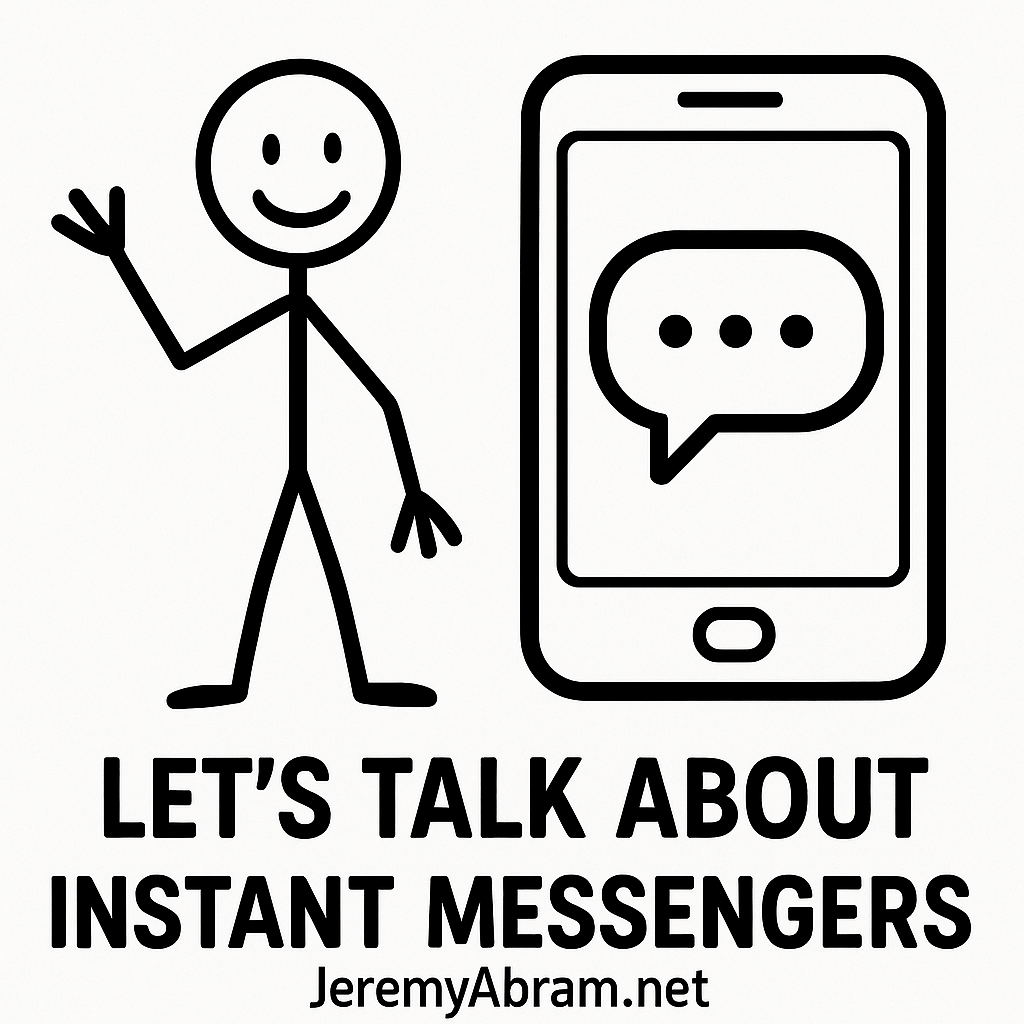
Let’s Talk About Instant Messengers
Let’s talk about instant messengers. For instance, Skype is one, Facebook has another, and there’s WhatsApp, and the list goes on.
The year 1875 must have been just a cool time — work as usual, no phone ringing, no alerts going off, not a worry of the power going out. People within your circle that mattered visited and connected without much more distraction than that of a bird flying by.
Why do we use this faster method of communication? Our gateway options were first mail, then telephone, then email. By using mail, telephone, and email, we learned that it would be cool to have communication be more instant. Developers thought instant messaging would be more convenient, possibly profitable — and so, instant messaging became something that since “everyone” now uses, is treated almost as a requirement. People use it in combination with or in place of email, postal service, and telephone. Instant messaging is just another option — but it comes with an on/off switch.
The concern I have when observing how people interact with instant messaging is how quickly it has become a default tool. I don’t think the technology options have been deeply studied by many. How scary would it be to not have proper research done before releasing a new prescription drug? WAIT — prescription drugs are thoroughly researched before release. But that’s a different point — those drugs don’t have such easy on/off switches. Things become more complicated.
In a fast world of communication, it’s easy to believe that all we see is all there is. Speed can create false security and rushed decisions. Our ability to filter becomes more limited; trust becomes equal to visibility. With a world full of options it feels possible to outrun stress by increasing use of options — but sometimes options become noise. We go on adding options, never shutting them off, not knowing why life feels overwhelming. We chase achievements based on popularity instead of our own needs and what will truly benefit us.
Sometimes, to feel better, one must use the on/off switch. I found that when I uninstalled auto-alert apps from my smartphone, my stress decreased. I didn’t lose much productivity — instead, I lost the wasted time and emotional reaction to every unimportant alert. I realized most alerts were marketing messages or unimportant communication.
I asked myself: If I don’t need to be alerted instantly, why am I letting alerts control me? If I could check email or messages later on my desktop at my convenience, the apps could go. I even shut down Skype during work because few clients truly needed instant response. Removing distraction improved my tasks and focus.
I remember when Facebook didn’t show a timestamp for when a message was read. You could read a message without the other person knowing immediately. It was nice and simple — no pressure. Now, timestamps raise expectations.
So here’s the question: if you’re sending a message that is not instant, do we need to know when it was read or delivered? We think we do. Yet, the U.S. Postal Service has been around long before digital read receipts — and society functioned. Many great achievements in history happened without instant solutions.
Needs and habits are two different things. We may get accustomed to convenience, but lacking convenience should not lead to distress. A habit of abundance — having more than we need — can be hard to break. But breaking it may bring peace. Society pushes constant achievement, likes, and validation — and companies benefit by feeding us new things to want.
Companies want you to believe you need more. When I grew up, wants were shaped by family and life examples. Today, children not only see what their families value — they also see curated feeds of wants from social media and advertising. The feed is stronger and more relentless.
Take alcohol ads — they highlight positives but not consequences. Cigarette ads once did similar before regulations forced warnings. If something is legal, many assume it’s safe — but legality doesn’t equal harmlessness. If an option exists, the responsibility shifts to us to use the on/off switch wisely.
We are raised to “try before you decide” — a good lesson. Yet sometimes it leads people into things they shouldn’t try simply because “it’s an option.” Can we overload our minds with too many options? Yes. Too many choices too fast can overwhelm the human mind before long-term effects are understood.
If an option is legal, should we use it? Only after choosing when and how — without letting it interrupt our life unnoticed.
There is truth to “be careful what you wish for.” I extend that to: be careful how you use what you get, and be especially careful with what you are offered for free.
Many years ago, I wrote about “needs” and posted it on Facebook as a story. Over time, I realized my frustration wasn’t with life — it was with forgetting my own needs and chasing options instead. This writing may not interest everyone, but I hope it reminds someone: you don’t need to share achievements to justify your worth. It’s okay to take time, to live by your own pace and needs.
Life becomes difficult when we only follow what is popular or rewarded. Your happiness and contentment matter most — not the expectations of others. Sometimes, reducing your options to what truly matters allows clarity to return.
When you once again have fewer fast-paced options and live slowly for a while, you regain footing. New options will always appear — choose carefully. Whatever your goals, be proud when you achieve them. Be happy, and give yourself a thumbs-up.
(c) Jeremy Abram
Leave a Reply